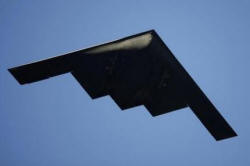|
 Contract
for new U.S. long-range bomber due soon: Air Force secretary Contract
for new U.S. long-range bomber due soon: Air Force secretary
 Send a link to a friend
Send a link to a friend
[August 25, 2015]
By Andrea Shalal
WASHINGTON (Reuters) - U.S. Air Force
Secretary Deborah James on Monday said a contract for a new long-range
bomber would be awarded soon, and the project would not be considered a
"new start" program that could be halted if Congress fails to pass a
budget for fiscal 2016.
|
|
 Northrop Grumman Corp, maker of the B-2 bomber, is competing
against a team made up of Boeing Co and Lockheed Martin Corp for a
deal that could be worth $50 billion to $80 billion to the winning
bidder. Northrop Grumman Corp, maker of the B-2 bomber, is competing
against a team made up of Boeing Co and Lockheed Martin Corp for a
deal that could be worth $50 billion to $80 billion to the winning
bidder.
James said the bomber program would not be subject to a ban on new
program starts that would take effect if Congress passes only a
year-long continuing resolution for fiscal 2016, instead of a
budget, since the program official began in fiscal 2012.
The Air Force says it has spent $1.8 billion on research and
development of the new classified aircraft since 2012.
The service kicked off the final competition for the bomber in July
2014, saying it expected to pick a winner this spring, but the award
date has been delayed several times. Last month James said the award
could slip into September.
 James decried a botched 10-year cost estimate for the new bomber
program that was submitted to Congress as a "regrettable error" and
said the cost of the program was not expected to rise nearly as
sharply as indicated by the faulty estimate.
She said the mistake, first reported by Bloomberg last week, stemmed
from human error and a lack of proper oversight, but the process had
been revised.
The initial Air Force projection for the cost of the bomber program
over 10 years submitted this year put the cost at $58.4 billion, a
76 percent spike from last year's estimate. The Air Force later said
the true cost estimate for the 10-year period was $41.7 billion.
[to top of second column] |

Representative Jackie Speier, a California Democrat and member of
the House Armed Services Committee, on Monday asked James for a
detailed explanation about the mix-up.
"It raises questions about the management of a crucial program that
lacks transparency, on which we cannot afford serious cost overruns,
development errors, and reduced production numbers that would
deprive the United States of one of its core military capabilities,"
she wrote.
(Additional reporting by Bill Trott; Editing by Peter Cooney and
Lisa Shumaker)
[© 2015 Thomson Reuters. All rights
reserved.]
Copyright 2015 Reuters. All rights reserved. This material may not be published,
broadcast, rewritten or redistributed.
 |